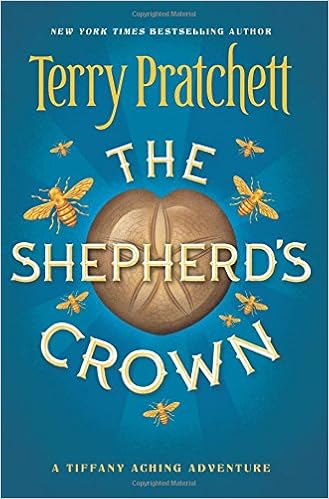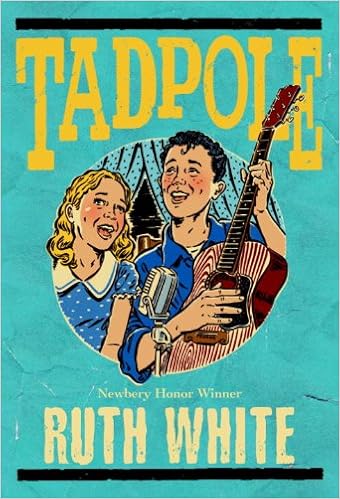LeGuin, Ursula K. (1970) The
Tombs of Atuan. New York: Aladdin.

Opening lines:
“Come home, Tenar! Come
home!”
In the deep valley. In the twilight. The apple trees were on the
eve of blossoming; here and there among the shadowed boughs, one flower had
opened early, rose and white, like a faint star.
Tenar is taken from her home as a little girl to serve in the
temple. There she slowly becomes a
servant to the God thought to reside there, and her life becomes dark and
twisted. When the wizard Ged arrives,
she helps to trap him in the labyrinthine maze under the temple, but she begins
to develop compassion for him as he seems to be starving to death. Before long,
however, the reader begins to wonder who is saving whom.
It is easy to see why this is considered a classic (and why it won
a Newbery Honor.) Le Guin is a master at
crafting a world and setting her characters into it so that it feels
natural. The story is gripping without
being a frenetic run from one cliffhanger moment to the next (as many modern
action adventure novels are. Instead, it
just grabs hold of the reader and will not let do.
This book would be ideal for advanced middle school readers or
high school readers. Those familiar with
fantasy will have the easiest time here.
There is nothing particularly offensive in the book, save mention of the
evil god in the beginning. Since Ged
saves Tenar from serving him, I think anyone familiar with the whole story
would not have a problem with it.
Pratchett, Terry (2015) The
Shepherd’s Crown. New York: Harper.


Opening lines: “It was one
of those days that you put away and remember.
High on the downs, above her parents’ farm, Tiffany Aching felt as
though she could see to the end of the world.”
My friend Kris first
introduced me to the Tiffany Aching books, and she lent me this one too. In this one Tiffany must continue serving as
the wise woman of two villages (even though she isn’t that old,) stop an invasion
of evil elves, and, as usual, manage her unpredictable and overenthusiastic
allies, the Wee Free Men – eight inch tall, hard-drinking celtic creatures who
look out for her, protect, her, and occasionally get her in big trouble.
The story is great, but the
writing is exceptional. Pratchett manages
to explore important themes without ever taking himself or the story too
seriously. At one point, after Tiffany
rescues an evil elf princess called Nightshade, who has been thrown out of the
faerie realm and is trying to learn about human life, there is this exchange:
“’I have been watching humans,’
said Nightshade…, ‘and I can’t understand them.
I saw a woman giving an old tramp a couple of pennies… Why would she do
that? How does it help her? I don’t
understand.’
‘It’s what we do,’ said
Tiffany. ‘The wizards call it
empathy. That means putting yourself in
the place of the other persona and seeing the world from their point of view.’”
(p 203) A [age later, Tiffany is trying
to talk the elf out of robbing a bank to give money to the old woman.
But look, that disconnected
summary doesn’t give you any idea of what reading this book is like. It is delightful, funny, and gripping all at
the same time.
This book is probably best for
8th grade and up. There is
nothing particularly offensive in it, although Tiffany and others like her
sometimes call themselves witches. Some parents
might object to the depiction of witches – though they do not do any evil or
sacrifice toads or whatever. Tiffany
mostly just tries to keep the land safe and care for the people on it.
Read it if you have a
moment. This one is a good one.
28 February 2017
White, Ruth (2003) Tadpole. New York: Dell Yearling.


Opening Lines: One day in
June, Mama found this ad in the paper: permanent waves one $ Sat morn come
early. And there was an address for a
boarding house in Riverbend.”
Carolina Collins always feels
inferior to her older sisters. Kentucky
is more popular than Caroline; Virginia is more attractive; and Georgia is
smarter. When their guitar-playing
cousin Tadpole shows up at her house one day, looking for a place to lay low
from his abusive uncle, he shakes up the town and Carolina begins to see that
maybe she has a talent for music, and a way to stand out from her sisters, Past of the charm of this story is the way
that it paints life in their little town as both heartwarming and a really
difficult place to scratch out a living.
This story is perhaps best for
fifth grade and older. It is more likely
to become a favorite of the girls, but boys would like the story as well. It might well make a good read aloud.
There is nothing particularly
offensive here, though child abuse is discussed, though not graphically
described.
Christine Brodien-Jones; Kneen, Maggie (2010) The Owl Keeper. New York: Scholastic.

Opening Lines: “When Max first saw the girl that night, standing beneath the owl tree, he thought she was a ghost or a vision, or maybe a comic-book character come to life. It didn’t occur to him that she might be real.”
Max is being raised in some weird world where an oppressive government is trying to kill off all the owls. He is being fed poisoned food that seems to sort of interfere with his memory. He is being watched.
But since his watchers don’t seem to pay attention to him at night, he often sneaks out and goes to the owl tree where one night he meets this mysterious girl and together (along with an owl) they decide to go on a quest to try to find Max’s Gran and the Owl Keeper who could save them all.
This world and these characters just don’t hold up real well. I don’t know what motivates the good guys. Sometimes I am not even sure what motivates Max. And the conclusion is inconclusive. It isn’t that it is a bad book, it is just that there are so many better books out there. Why waste your time with this one.
No comments:
Post a Comment